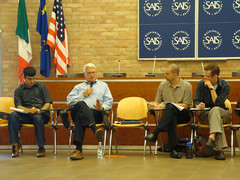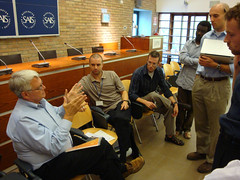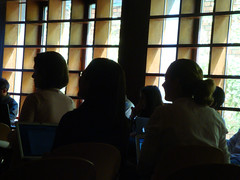 The morning lecture of July 7th started with an AFI award-winning film by a young Bosnian refugee, Harun Mehmedinovic, entitled “In the name of the son”. The movie tells the story of Tarik, a Bosnian former prisoner of war, who immigrated to the United States to leave his traumatic past behind. Many years later, he meets the Serbian soldier who had spared his life, and “naturally”, remembered the collective nightmare he had experienced during the early 90s.
The morning lecture of July 7th started with an AFI award-winning film by a young Bosnian refugee, Harun Mehmedinovic, entitled “In the name of the son”. The movie tells the story of Tarik, a Bosnian former prisoner of war, who immigrated to the United States to leave his traumatic past behind. Many years later, he meets the Serbian soldier who had spared his life, and “naturally”, remembered the collective nightmare he had experienced during the early 90s.
Since we recently discussed the Bosnia-Herzegovina War, it was a great opportunity to go through all its related issues, such as identity and construction of mythology, in addition to our previous lectures. Professor William Stuebner, Former Special Adviser to the Prosecutor of the International Criminal Tribunal Yugoslavia (ICTY) and Former Chief of Staff and Senior Deputy for Human Rights of the OSCE Mission to Bosnia and Herzegovina, led the discussions.
Mr. Stuebner highlighted ICTY’s failure in Bosnia to break the cycle of violence. According to him, the main problem was that the ICTY forgot their real clients: the victims of the Balkans. Moreover, for years the ICTY’s decisions were transcribed in English and French, completely ignoring the local languages and consequently people involved couldn’t read them. Furthermore, our speaker illustrated the problem of the Truth and Reconciliation Commission: first of all, reconciliation is something extremely personal; second of all, there’s too much truth, too many PhDs in Sarajevo (basically, too much talking and not enough action).
 In addition, we talked about media’s participation in conflict. It was mentioned how media can encourage the local population to engage and to participate actively of their community’s political life. On the other hand, they may reproduce stereotypes that can perpetuate rivalries, besides establishing a particular view of a war’s history that does not necessarily represents reality. In such situations, it may end up becoming a tool to legitimize violent regimes and make the chaotic scenario even worse.
In addition, we talked about media’s participation in conflict. It was mentioned how media can encourage the local population to engage and to participate actively of their community’s political life. On the other hand, they may reproduce stereotypes that can perpetuate rivalries, besides establishing a particular view of a war’s history that does not necessarily represents reality. In such situations, it may end up becoming a tool to legitimize violent regimes and make the chaotic scenario even worse.
Winston Churchill once said that the Balkans produce more History than they can consume, no one forgets anything there. Regardless, the Balkans weren’t the first genocide in History, nor the last. What is surprising, however, is the remaining silence of the international community towards these atrocities committed.
As someone said in relation to the Jewish genocide: “We must not forget the past, but if we are not motivated to action, then we are doomed to repeat it”. Until some kind of “do no harm” strategy is adopted, where the local population can actually take part of reconciliation and delegitimize any current politics of fear, the Balkans (as others) will keep producing “History”.
 Moving from Bosnia to Iraq after lunch, we had an extraordinary presentation by Major Anthony Cerella, one of our own Bologna Symposium’s students. Tony talked about the US Army’s modus operandi and his experiences after 10 years of military service – stationed in Texas and Kansas (USA), South Korea and, more recently, Iraq. He explained how to engage the local population in order to gain trust and help the establishment of peace, as well as humanizing the military, exceeding all the expected limitations.
Moving from Bosnia to Iraq after lunch, we had an extraordinary presentation by Major Anthony Cerella, one of our own Bologna Symposium’s students. Tony talked about the US Army’s modus operandi and his experiences after 10 years of military service – stationed in Texas and Kansas (USA), South Korea and, more recently, Iraq. He explained how to engage the local population in order to gain trust and help the establishment of peace, as well as humanizing the military, exceeding all the expected limitations.
With a huge mustache, a.k.a Fred, Tony showed a great deal of humility during his time in the Middle East. He emphasized the importance of establishing an Iraqi Military Doctrine, not an American one, respecting its own particularities and forms of operating. According to him, the best way to accomplish a mission in a completely different cultural (and political) environment is stepping out of your comfort zone and diving into the new world in front of you. Major Cerella broke all stereotypes I’ve had about an American soldier, and I truly hope he’s not an exception.
Finally, to end a beautiful journey, about 20 students – myself included – went to play soccer in one of Bologna’s parks. Like in a duel of titans, or not so much, the team wearing dark clothes won the light ones by 8-0 – thanks to Usman, Mike, Renad and an Italian dude. Actually, it might have been more than 8 goals – we stopped counting as a strategy to prevent conflict. After all, that’s a part of what we came here for, right?
Bárbara Tigre Maia, Brazil

